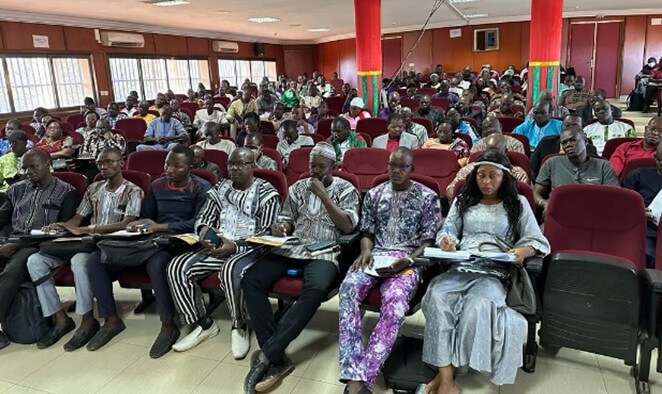What is the job of a stakeholder engagement expert?

Stakeholder engagement is one of the fundamental pillars of Target Malaria. It is an evolving and inclusive process that enables the project to conduct its activities with complete transparency and strong stakeholder involvement. In other words, it is the ideal framework for the co-development of an innovative genetic technology that has the potential to contribute to the elimination of malaria. Target Malaria’s vision of a malaria-free world involves developing new genetic technologies aimed at controlling malaria transmission by reducing the population of mosquito vectors in sub-Saharan Africa.
Stakeholder engagement makes it possible to inform, consult, co-construct knowledge, collaborate and build technology with various communities, including those involved in other programmes, stakeholders (NGOs and CSOs) and decision-makers. It facilitates understanding of the research activities and promotes acceptance of the final technology.
In Burkina Faso, Target Malaria is in its second phase of research. Following the successful implementation and conclusive results of the first phase, with the non gene drive genetically modifiedsterile male mosquito , the IRSS submitted a dossier to the Agence Nationale de la Biosécurité (ANB, National Biosafety Agency) and obtained authorisation for the importation and contained use studies of the non gene drive genetically modified male bias mosquito strain in a confined laboratory environment. We are currently continuing to work on the potential implementation of genetically modified mosquito with new stakeholders at a national level.
At the national level, the engagement team is responsible for co-constructing and leading the ongoing dialogue with stakeholders. Our stakeholders are diverse and spread throughout Burkina Faso. Key stakeholders are mainly located in Ouagadougou, the capital of Burkina Faso, but are also present in the other regions of the country. As part of our commitment, we communicate with all categories of the population in all 13 regions of the country. Their concerns are diverse and evolving in the light of current events. They include civil servants from the public and private sectors, members of civil society organisations and non-governmental organisations, students, players in the informal sector, and customary and traditional religious authorities. It is a mixed group, with some stakeholders having no information on biotechnologies and others who have strong opinions on these technologies.



Several types of formats are used to engage stakeholders: face-to-face and virtual meetings, individual meetings, meetings with small groups and larger meetings. Even if we have all the information about the project, these forums provide us with further opportunities to give and receive information. Stakeholders are not new to the information we provide them with. Some of them have been following our project since 2012, have the information at their disposal and are very interested in discussing it with us.
My job as Stakeholder Engagement Officer is a fascinating one. It’s the key that opens the door to all the offices, and workplaces all over Burkina Faso. I’m meeting new people and learning a lot about my country and my fellow citizens. I feel proud to be working towards eliminating malaria in Burkina Faso and Africa as a whole. I am very confident that we will succeed, thanks to the willingness and readiness of stakeholders who aspire to one day live in a country and continent free of malaria.
However, some stakeholders are still lacking correct information with the increased misinformation often propagated on social networks. Our commitment is to be present and available to provide correct information about the project, about malaria, and about mosquitoes. Whatever comes our way, I am confident in the efficiency and impact of my team’s work, as we continue to listen tostakeholders, answer their questions and discuss the promise of the gene drive technology to accelerate efforts to eliminate malaria in my country.
